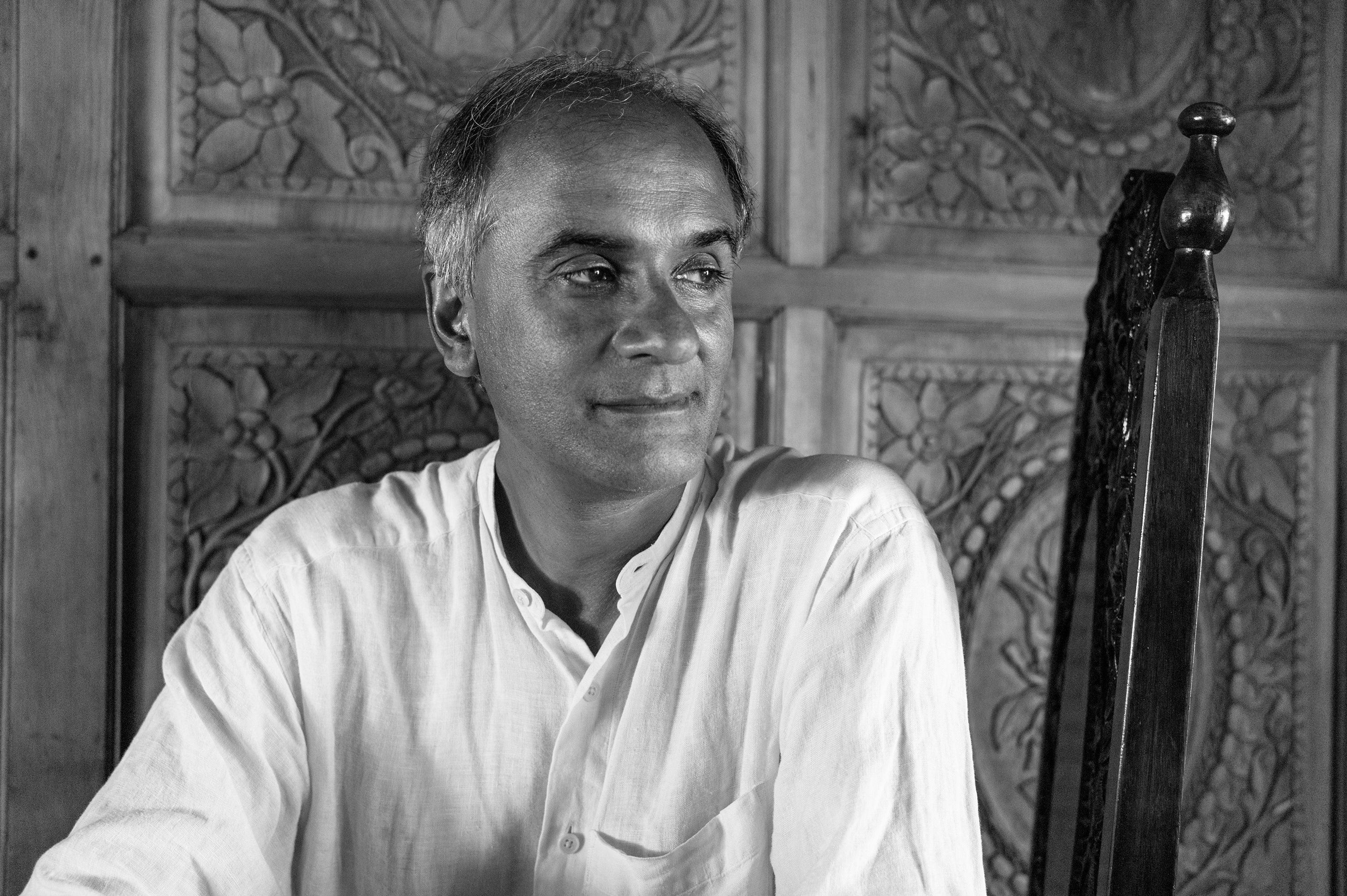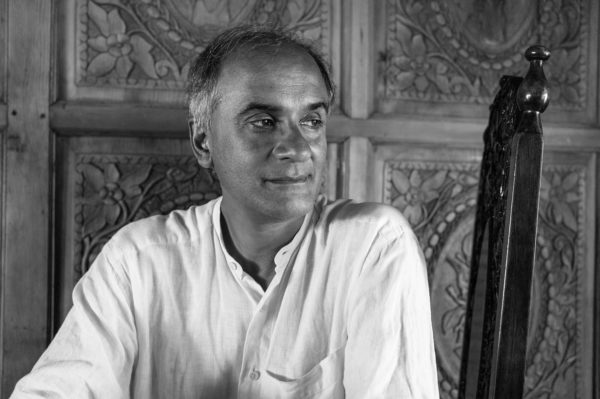
08 May Mountainfilm: Pico Iyer, The Age of Movement
Mountainfilm takes place in Telluride over Memorial Weekend, May 25 – May 28. Passes to the 2018 festival are selling out fast. To get your passes or for more information about Mountainfilm, visit here.
Telluride author Susan Dalton captures Mountainfilm‘s best memories in “Mountainfilm: 40 Years.” The beautiful coffee table book costs just $49 (tax included) and can be pre-ordered now here.
In keeping with the theme of the 45th annual Mountainfilm weekend, migration, world-renowned travel writer and thinker Pico Iyer talks to the tribe gathered in Telluride about “The Age of Movement.”
Please scroll down to listen to Pico Iyer’s podcast to learn more.

For so long now that it feels like forever we have been fighting in the dark about everything under the sun.
So long we are running out of lawn for the next contentious conversation.
The next download of breaking news from CNN.
The next bombshell of a tweet.
In sharp contrast to the teaching of the “Father of Yoga,” Patanjali, who in his “Yoga Sutras” defines the goal of the science as restraining the rising of the mind into ripples, quieting the noise, the mind-stuff in our heads.
In sharp contrast to Henry David Thoreau, who reminded us that “the man whose horse trots a mile in a minute does not carry the most important messages.”
In contrast to Marshall McLuhan’s warning: “When things come at you very fast, naturally you lose touch with yourself.”
In his TED Talk (August 2014) entitled “The Art of Stillness,” renowned traveler and writer Pico Iyer – who does, by the by, not own a cell phone and has never Tweeted or entered Facebook or been on Instagram – put it this way:
“In this age of acceleration, nothing is more exhilarating than going slow.”
“In this age of constant motion, nothing is so urgent as sitting still.”
“In this age of distraction, nothing is so luxurious as paying attention.”
In another TED Talk (October 2016) entitled “The Beauty of What We’ll Never Know,” Iyer added – and here we are paraphrasing – “transformation is only as strong as our readiness to surrender…”
At Mountainfilm, Friday, May 25 – Monday, May 28, the official kick-off of Telluride’s summer festival season, the gathered tribe will slow down, sit still, pay attention and surrender to uncertainty, wonder and possibility when Iyer talks about the complement to stillness, “The Age of Movement.”
Movement and migration are the twin subjects of this year’s Moving Mountains Symposium and the overarching theme of the event’s 40th anniversary celebration, with scientists, journalists, authors, renowned speakers and films on the topic happening all weekend long.
Migration – not travel or movement, two of Iyer’s favorite subjects – is a pressing issue that is altering millions of lives – human and animal – sparking controversy and bringing to light the consequences of climate change across our Blue Marble.
The number of refugees topped 65 million in 2017 — the highest number in mankind’s history and a more than 10 percent increase over the year before. Between the massive refugee crisis fueled by the war in Syria, tendentious political debates over Muslim bans and border walls, and the news of sharp shifts in animal behaviors because of global warming, Mountainfilm decided the subject is more than worthy of a deep dive.
Iyer can speak with authority on both movement and travel in general and migration specifically because he is a lifelong wanderer across borders himself, a person of Indian descent, who was born in 1957 in Oxford, England and moved to California at the age of seven.
Iyer then started commuting, throughout his childhood, between a 15th-century boarding-school in England and his parents’ yellow mountaintop home in California.
In fact, in his work as a novelist and essayist, which he describes as more “joy” than “job,” Iyer has spent more than 30 years tracking movement and stillness — and the way criss-crossing cultures have changed the world, our imagination and all of our relationships.
Educated at Eton, Oxford and Harvard – and most importantly, all over the world – Pico Iyer has been based, since 1992, in western Japan, when not traveling everywhere from North Korea to the Easter Islands, Yemen to Bolivia.
Iyer is the author of 12 books on subjects ranging from the Cuban Revolution to Islamic mysticism, from the 14th Dalai Lama to a monk’s life in Japan, collectively translated into 23 languages.
He has also written the introduction to more than 60 other books, while penning up to 100 articles a year for decades for Time, Harper’s, The New York Times, Granta and more than 200 other publications.
Described by Outside a few years ago as “arguably the greatest living writer,” Iyer gave the aforementioned three talks for TED over the past few years so far seen by more than seven million people.
Pico Iyer is also a returning presenter to Mountainfilm. He first attended the event in 2005, when he spoke, to his recollection, about everything from Bolivia to Cartier-Bresson.
In 2008, Iyer’s subject was Tibet.
“I now seem to be a regular visitor to Telluride since every September I attend the Telluride Film Festival. When I return again, this time to Mountainfilm, I’ll be talking about the Age of Movement which all of us are a part of – some of us in privileged ways and more and more as refugees – and drawing on my experiences with communities in Tibet and Yemen and elsewhere. I’ve been talking and traveling with the Dalai Lama for 44 years now – since I was 17 – and for nine recent Novembers, I traveled by his side, standing just inches away from him on his annual trip to Japan. And apart from looking at exile communities from everywhere from Cuba to Iran, I am, as is widely known, a migrant myself. Perhaps I will address the way all of us can feel like exiles at times, even if we never leave our homes.”
A migrant who when asked “Where is Home? – the title of a TED Talk Iyer delivered in July 2013 – concludes that “home is a work-in-progress.”
Home is not about soil, but soul.
It is the place, Iyer suggests, “where you become yourself.”
Which for all too many caught up in constant momentum and the noise in their heads without end remains elusive.
Is there an answer to what is fast becoming an existential crisis – like and often related to climate change – for the world, threatening the extinction of species and cultures?
Can peoples (and animals), all beings in constant motion, either by design or because of circumstances beyond their control, ever transcend transaction and find a safe place to stand still?
According to Iyer, the Dalai Lama’s regular response to a difficult question that like is “I don’t know.”
However, as a guide to far-flung places, external and internal, in his often unexpected, but always lyrical meditations, in the words of The New Yorker, “Pico Iyer can hardly be surpassed.”
With Iyer, the “floating tribe” that is Mountainfilm is sure to enjoy taking a plunge into uncertainty.
All we have to do is hold our noses and jump (for joy).


Sorry, the comment form is closed at this time.